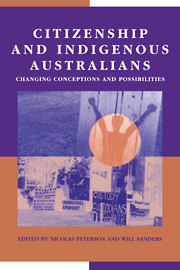Book contents
- Frontmatter
- Contents
- Contributors
- Preface
- Abbreviations
- 1 Introduction
- Part I Historical Conceptions
- Part II Contemporary Conceptions
- 4 Indigenous Citizenship and Self-determination: The Problem of Shared Responsibilities
- 5 Welfare Colonialism and Citizenship: Politics, Economics and Agency
- 6 Representation Matters: The 1967 Referendum and Citizenship
- 7 Citizenship and the Community Development Employment Projects Scheme: Equal Rights, Difference and Appropriateness
- 8 Citizenship and Indigenous Responses to Mining in the Gulf Country
- Part III Emerging Possibilities
- Index
6 - Representation Matters: The 1967 Referendum and Citizenship
from Part II - Contemporary Conceptions
Published online by Cambridge University Press: 23 September 2009
- Frontmatter
- Contents
- Contributors
- Preface
- Abbreviations
- 1 Introduction
- Part I Historical Conceptions
- Part II Contemporary Conceptions
- 4 Indigenous Citizenship and Self-determination: The Problem of Shared Responsibilities
- 5 Welfare Colonialism and Citizenship: Politics, Economics and Agency
- 6 Representation Matters: The 1967 Referendum and Citizenship
- 7 Citizenship and the Community Development Employment Projects Scheme: Equal Rights, Difference and Appropriateness
- 8 Citizenship and Indigenous Responses to Mining in the Gulf Country
- Part III Emerging Possibilities
- Index
Summary
The 1967 referendum to alter Australia's Constitution is now seen as an event that marked a major turning point in Aboriginal–European relations in Australia. In this chapter we will examine the referendum from a number of perspectives. First, we explore its constitutional significance: can the argument be made, for example, that it conferred citizenship on the Aboriginal people in a legal sense? Secondly, we consider the much more complex issue of the meanings attached to the referendum, both in the immediate context and in the medium and long term: how was the referendum understood by the government that presented it to the electorate, by the political lobbyists who argued for change, and by those who voted? How have these understandings changed over time, and what explains the divergent meanings attached to the referendum today?
Over the last decade enormous significance has been attributed to what is now called the 1967 Aboriginal Rights Referendum or simply the 1967 Aboriginal Referendum. Meanwhile the nature of the constitutional changes it entailed has been increasingly submerged. Myths about the referendum are promulgated in many forums and have acquired enormous authority over time.
- Type
- Chapter
- Information
- Citizenship and Indigenous AustraliansChanging Conceptions and Possibilities, pp. 118 - 140Publisher: Cambridge University PressPrint publication year: 1998
- 6
- Cited by



